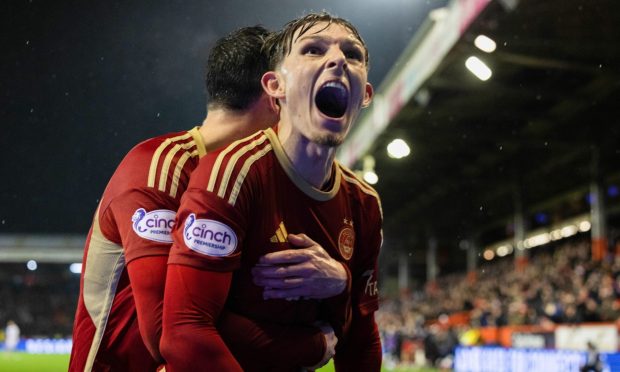It was Einstein who postulated that the rate at which time passes must differ depending on the perspective of the observer.
The concept will feel relatively familiar to Aberdeen fans, with special reference to the intervals between their club’s trophy acquisitions.
Though the seminal winning of this competition at Celtic Park still feels fresh in the memory, the Dons’ active cup drought, if it is fair to call it such, is already more than halfway to emulating the length of that which was joyously broken by it.
So severely encumbering and unremitting had that fallow period felt, it is hard to believe that what has been, in the main, a more than reasonable era is potentially well on the way to repeating it.
As the legendary physicist concluded, time slows the faster one moves, and given the reference frame of the state the club had allowed itself to get into, the near-decade since March 2014 has seen it travelling in a broadly positive direction.
With the scenery mostly appealing, the journey has not been elongated by the absence of a final destination.
To put it in more prosaic terms, while the dearth either side of the turn of the century felt like forever largely because it truly appeared as if it might indeed be, the modern Dons’ general competitiveness has afforded them a little scope to be less conspicuously bereft.
It would be wrong to say that it has passed unnoticed, but the ticking of the clock has not been as loud as it was when it echoed constantly around the deep hole the club had dug itself.
But in earthly realms, where the physical boundaries of possibility are drawn far shorter than the theoretical ones of scientific exploration, that dilation will only stretch so far.
Both the unquantifiable variables of history and stature, and the all too measurable one of investment, require that more silverware visits Pittodrie sooner rather than later.
Perhaps now, as the controls of popular culture’s most famous time-shifting device pass from west of Scotland hands to east of Scotland ones, the moment is right for the League Cup to do the same.
As the last national final which will be played before the tenth anniversary of Russell Anderson’s trophy lift, it would be opportune.
The Dons will not require to look very far for inspiration from 2014, for when Barry Robson leads his team into battle he will be repeating the walk he made that day.
Sent up first, tasked with converting the advantage created by Jamie Langfield’s opening save, Robson’s 11-yard run up and preposterous toe-bash into the bottom corner were of a man who simply would not be denied.
Hang the technique: on a desperately nervous afternoon, there was no better person to stride to the front and cast all doubts clanging into the net rigging.
Whatever else has occurred in his brief management career so far, it is inconceivable that someone of Robson’s character will not bring all of that self-assurance again this weekend.
Having already schemed two, very nearly three, winning efforts against these opponents, why wouldn’t he?
And all those who will join him at Hampden in support of Aberdeen’s cause – fewer than should have been the case, but those are conversations for a different day – must travel in similar belief.
This will be a tough contest, and for as long as it lasts the Red Army’s role is nothing other than doing whatever is called for to will the team to victory.
If successful, it will create the conditions for time to stop completely in an instant we can live forever, and that is always worth the wait.

